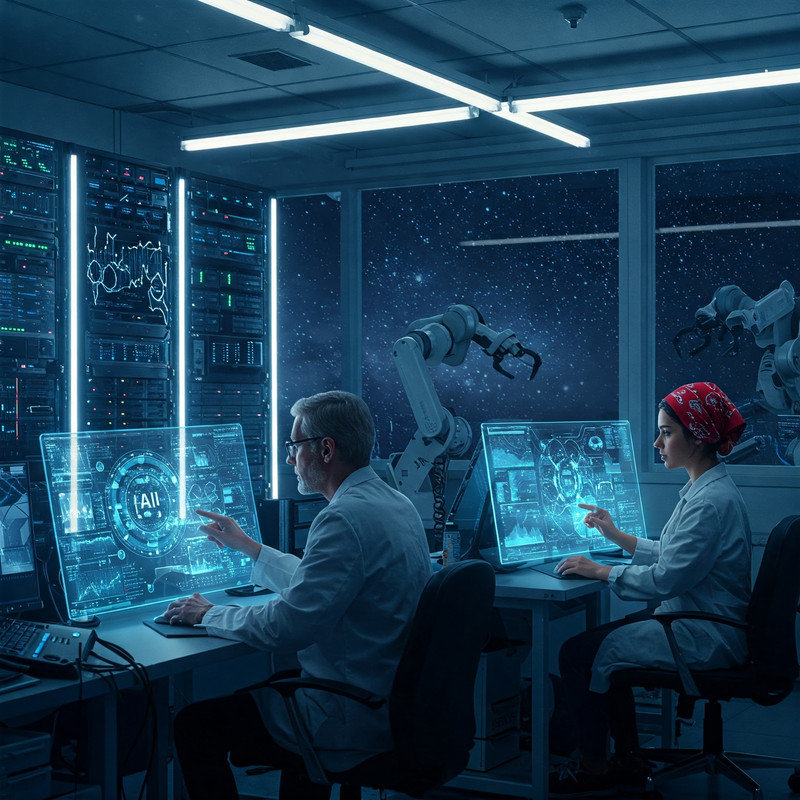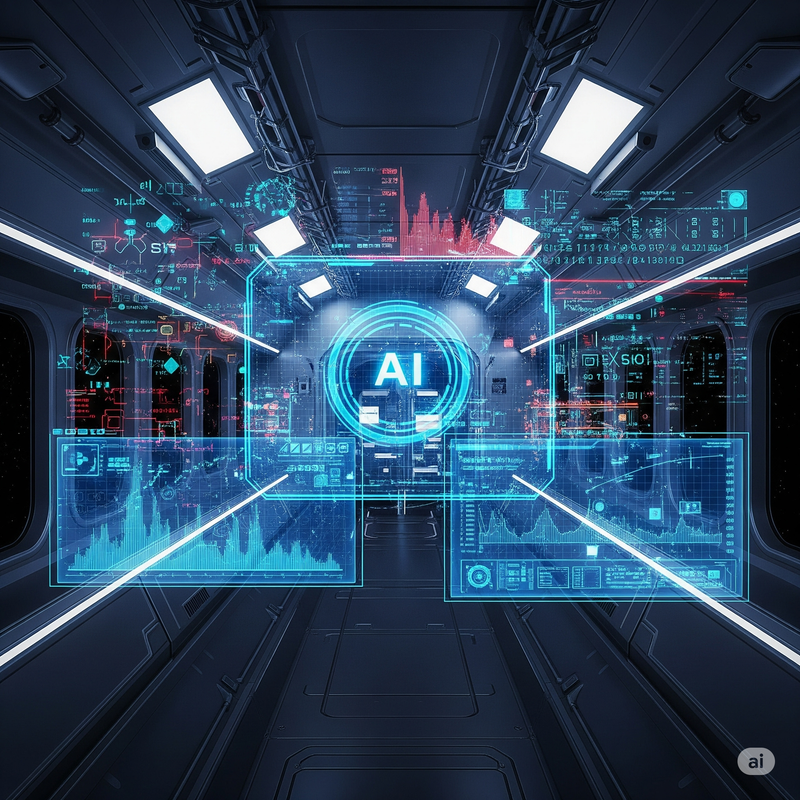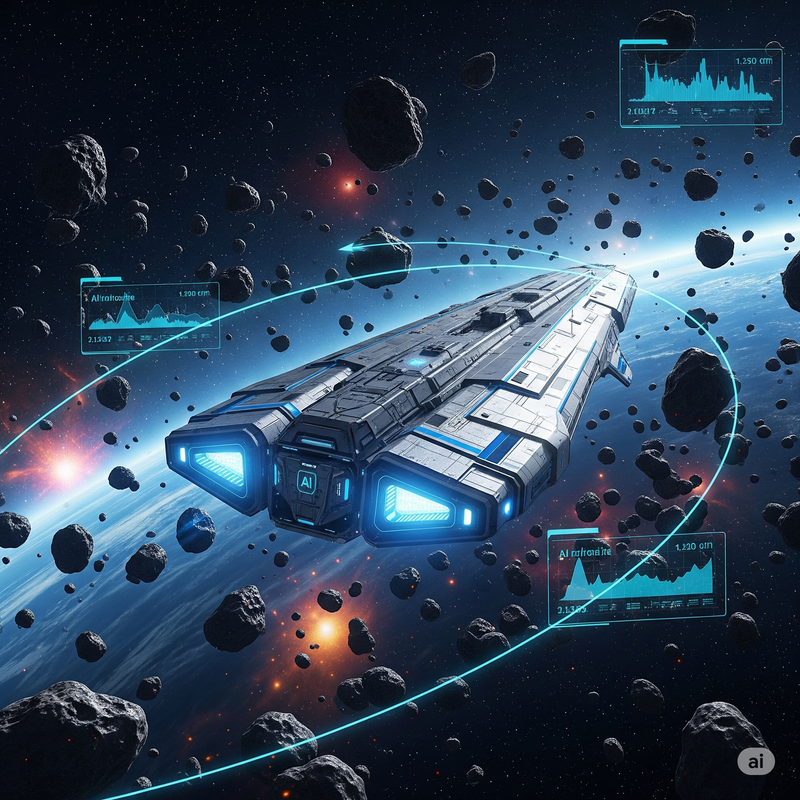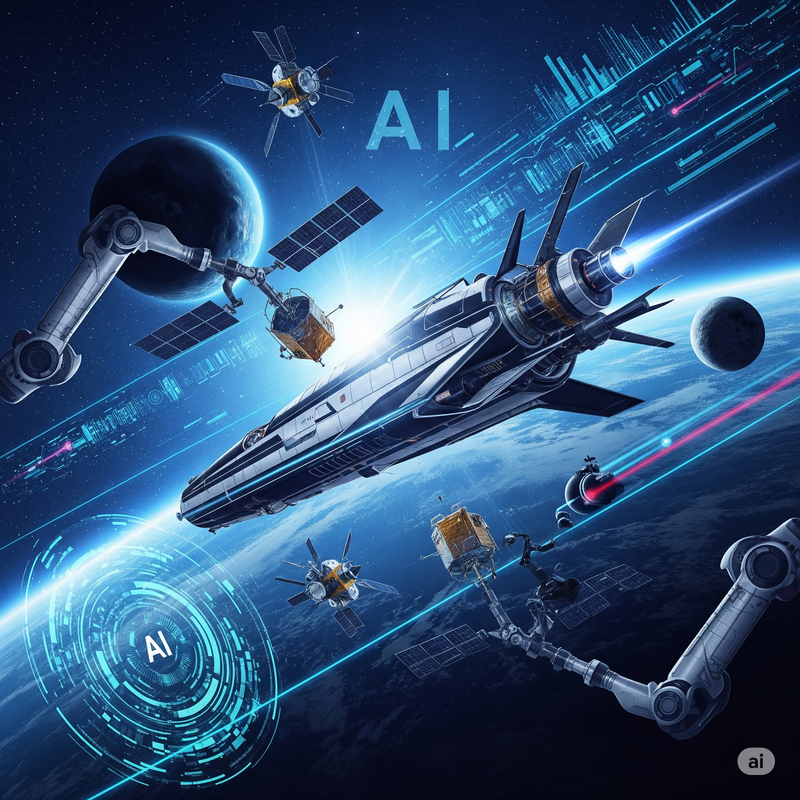How AI is Powering Space Exploration
AI in Space Exploration: How Artificial Intelligence is Changing the Future of Space Missions
Published on: May 21, 2025
Labels: AI in Space, Space Exploration, Artificial Intelligence, Space Technology, Space Missions, AI Driven Exploration, Future of Space

Artificial intelligence is increasingly becoming a driving force in humanity's quest to explore the cosmos.
Introduction: Charting New Galactic Paths with AI
Artificial Intelligence (AI) is rapidly emerging as a transformative force across countless industries, and **space exploration** is undoubtedly one of its most exciting frontiers. From launching autonomous spacecraft that make decisions millions of miles away to processing vast cosmic datasets and enhancing astronaut safety, AI is fundamentally revolutionizing how we push the boundaries of interstellar discovery. This integration of advanced computing promises to unlock capabilities once confined to science fiction, making missions faster, more efficient, and potentially extending humanity's reach further into the universe than ever before. Let's delve into how AI is reshaping the future of space exploration and the compelling benefits it offers over traditional human-led approaches.

AI-powered spacecraft can perform complex operations autonomously, reducing the need for constant human oversight.
What is AI in Space Exploration?
**AI in space exploration** refers to the strategic application of artificial intelligence technologies to automate, optimize, and enhance various aspects of space missions that would traditionally demand intensive human involvement. This encompasses everything from deep-learning algorithms for spacecraft navigation and anomaly detection to machine vision systems for planetary surface analysis and intelligent robots for in-situ resource utilization. At its core, AI empowers spacecraft and ground systems to:
- Make **autonomous decisions** in real-time, especially when communication delays with Earth are prohibitive (e.g., missions to outer planets).
- **Analyze vast datasets** from telescopes, probes, and rovers with unprecedented speed and accuracy, identifying patterns and discoveries hidden to the human eye.
- **Enhance mission efficiency** by automating routine tasks, optimizing resource consumption, and predicting potential system failures.
- **Overcome challenges** like extreme distances, harsh radiation environments, and complex terrain, enabling missions that are too risky or long for human crews.
Unlocking the Cosmos: Advantages of AI in Space Exploration
The benefits of integrating AI into space missions are profound and multi-faceted:
- Enhanced Autonomy for Deep Space: AI allows spacecraft to operate independently for extended periods, reducing the constant need for human intervention from Earth. This is crucial for deep-space missions where communication delays can be minutes or hours, making real-time human control impossible.
- Unmatched Efficiency and Speed: AI systems can process and analyze astronomical amounts of data (images, sensor readings, telemetry) far faster and more accurately than human teams. This leads to quicker scientific discoveries, more efficient resource allocation, and better real-time decision-making in dynamic environments.
- Significant Cost-Effectiveness: While AI development itself can be costly, in the long run, autonomous AI-driven missions can drastically reduce overall mission costs by eliminating the need for expensive human crews, complex life support systems, and the associated safety protocols and training.
- Extended Mission Durations and Scope: AI-powered probes and rovers aren't constrained by human physiological limits like fatigue, radiation exposure, or psychological factors. This enables long-duration missions to extreme environments, opening up new avenues for scientific exploration that would be impossible with human presence.
- Improved Safety and Risk Mitigation: By handling hazardous tasks, operating in dangerous environments, and predicting potential equipment failures, AI can significantly reduce risks to human lives and mission assets.
- Greater Scientific Return: AI can identify patterns and anomalies in data that humans might miss, leading to unexpected discoveries. It can also manage complex instrument operations, ensuring optimal data collection.

AI excels at processing and analyzing vast amounts of data collected from space, identifying crucial patterns.
Navigating the Unknown: Disadvantages and Challenges of AI in Space Exploration
While the advantages are compelling, the integration of AI also presents significant challenges and ethical considerations:
- Lack of Human Intuition and Adaptability: AI systems excel at tasks they are trained for, but they currently lack the intuitive decision-making abilities, creative problem-solving, and adaptability that humans possess, which can be crucial in truly novel or highly unexpected situations far from Earth.
- Reliability and Resilience Concerns: AI systems, like any complex technology, are prone to malfunctions, bugs, or errors. A catastrophic failure in deep space where repairs are impossible could jeopardize an entire mission. Ensuring extreme reliability and redundancy in autonomous systems is paramount.
- Ethical and Accountability Dilemmas: As AI systems gain more autonomy, questions arise about accountability for mistakes or unforeseen consequences. Who is responsible if an AI makes a critical error that leads to mission failure or damage?
- Cybersecurity Vulnerabilities: Autonomous AI systems could be potential targets for malicious cyberattacks, leading to hijacking or disruption of critical space assets.
- The 'Black Box' Problem: Many advanced AI models, particularly deep neural networks, can make decisions in ways that are opaque to human understanding, making it difficult to fully audit or trust their reasoning in critical situations.

Robotic arms equipped with AI can perform delicate tasks and maintenance, reducing risks for human astronauts.
The Future Frontier: Human Space Exploration vs. AI in Space Exploration
It's not necessarily a matter of choosing one over the other, but rather how these two approaches can complement each other. However, a comparison highlights their distinct advantages:
| Aspect | Human Space Exploration | AI in Space Exploration |
|---|---|---|
| **Risk Factor** | High, as human lives are directly involved, requiring extensive life support, safety protocols, and rescue capabilities. | Lower for human life, as AI systems are autonomous robots; risks are primarily financial (loss of machine) or mission-specific. |
| **Efficiency & Speed** | Slower due to human physical and psychological limitations, need for rest, and communication delays for distant missions. | Significantly higher; AI systems work 24/7, can process data instantly, and make rapid, data-driven decisions. |
| **Cost** | Very high, encompassing astronaut training, complex life support systems, extensive safety measures, and long-term health concerns. | Lower in the long run; high initial development but reduced operational costs as AI systems don't require life support, food, or extensive safety infrastructure for humans. |
| **Decision Making** | Relies on human judgment, creativity, intuition, and ethical reasoning, which can be slower or influenced by fatigue/bias. | AI systems make faster, objective decisions based on programmed logic and data; lack intuition, ethics, or common sense. |
| **Mission Duration** | Limited by human endurance, health constraints, radiation exposure, and psychological factors in prolonged isolation. | Can operate for extended periods (decades, theoretically) without fatigue, ideal for long-duration deep-space missions. |

AI systems can oversee and manage complex space missions, ensuring efficiency and optimal resource utilization.
Conclusion: An Intelligent Leap for Humanity
Artificial Intelligence is no longer just a supporting player in space exploration; it is rapidly becoming a central protagonist, driving an unprecedented era of discovery and pushing the boundaries of what's possible beyond Earth. While challenges remain, particularly concerning reliability, ethical governance, and the irreplaceable nuances of human intuition, the advantages of AI — in terms of autonomy, efficiency, cost-effectiveness, and enabling bolder missions — are undeniable. As technology continues to advance, AI will play an increasingly crucial and integrated role in humanity's journey to explore the stars, helping us unravel the universe's greatest mysteries and perhaps, one day, making us a truly multi-planetary species. The future of space is undoubtedly intelligent.
Explore More Science by Rao:
- The Moon as Earth’s Backup: Why Lunar Colonization Is Back in the Spotlight
- Terraforming Mars: Can We Turn the Red Planet Green?
- AI Weather Control: Can We Stop Hurricanes and Droughts?
- The Future of Nuclear Fusion: Unlimited Clean Energy?
- Powering Earth from the Stars: Space-Based Solar Energy
- The Future of AI in Earth Observation and Environmental Monitoring
- AI in Warfare: How Artificial Intelligence is Revolutionizing Modern Battlefields
Follow and Connect with Science by Rao:
Stay updated by clicking the follow button on the sidebar!
Privacy Policy | Disclaimer | About the Author
Comments
Post a Comment